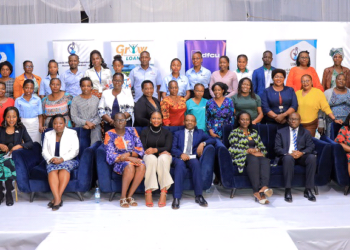As the world prepares to commemorate World AIDS Day on December 1, 2024, Uganda’s Minister for the Presidency, Babirye Milly Babalanda, has emphasized the need for increased male involvement in HIV prevention efforts.
In Uganda, World AIDS Day will be marked at Bukungu Primary School in Buyende district, where Minister Babalanda is affectionately known as the “Hope for Budiope West Constituency 2026/2031.”
According to Babalanda, engagement of men in the fight against HIV is crucial for several reasons, chiefly because men are often the primary transmitters of HIV to their female partners, particularly in heterosexual relationships.
“…engaging men in HIV prevention efforts can help reduce the number of new infections…”, she stressed.
She says men often hold positions of power and influence within families and communities, and so by engaging men in HIV prevention efforts, meaning they can become agents of change, promoting positive behaviors and reducing stigma.
In Uganda, like in many African countries, most men are often less likely to access health services, including HIV testing and treatment and so engaging men in HIV prevention efforts can help increase their access to these services.
Experts also say men’s engagement in HIV prevention efforts can also help reduce gender-based violence, which is a significant driver of HIV transmission among women and girls.
However, men can also be a hindrance in the fight against HIV if they perpetuate harmful gender norms since some men still hold traditional, patriarchal views that increase women’s vulnerability to HIV.
There are also a number of men who engage in high-risk behaviours, such as multiple sexual partnerships or substance abuse, can increase the transmission of HIV.
According to experts, some men who fail to disclose their HIV status to their partners can put them at risk of infection while some who control their partners’ access to health services can prevent them from receiving HIV testing, treatment, and care.
In a nutshell, Minister Babalanda’s call to engage men in HIV prevention efforts is a crucial step in the right direction to ensuring that all stakeholders right from family levels are involved.
Minister Babalanda says the Buyende event will also serve as a platform to raise awareness, promote HIV testing, and encourage community involvement in the fight against HIV/AIDS.
As part of prgrammes to mark the day, the leadership of Buyende in conjunction with partners has organized the pre-event activities, which include the health service provision starting from 25th -30 November,2024
These services are HIV testing, cancer screening, syphilis screening, Hepatitis B screening, malaria, sickle cell screening and non-communicable diseases management, and general health awareness through mobile film van across the district.
This year’s theme, “Accelerating Interventions to End HIV/AIDS by 2030,” synchronizes deeply with Uganda’s goals.
Globally, significant progress has been made in combating HIV/AIDS. According to UNAIDS, 30.7 million people living with HIV were on life-saving treatment as of 2023, a fourfold increase since 2010.
AIDS-related deaths have halved, and new HIV infections among children have decreased by 62% over the same period.
Despite these advancements, achieving the 2030 target remains a daunting task.
The global community must address existing gaps in HIV prevention and treatment, particularly among vulnerable populations such as adolescent girls and young women.
As the global community comes together to commemorate World AIDS Day, it is clear that achieving the 2030 target will require sustained efforts, increased funding, and innovative approaches to addressing the epidemic.
With renewed commitment and collective action, it is possible to end AIDS as a public health threat by 2030.
What You Need To Know:
World AIDS Day is a global health day observed on December 1st every year to raise awareness about the AIDS (Acquired Immune Deficiency Syndrome) pandemic caused by the HIV (Human Immunodeficiency Virus) virus.
The day is dedicated to uniting people worldwide in the fight against HIV/AIDS, showing support for those affected, and remembering those who have died from the disease.
The main purposes of World AIDS Day are to educate people about HIV/AIDS, its causes, consequences, and modes of transmission. It is also to encourage people to treat those affected with dignity and respect.
Its other purpose is to encourage people to take steps to prevent HIV transmission and to seek treatment if infected and to encourage governments, organizations, and individuals to provide support and resources for HIV/AIDS research, prevention, and treatment.
World AIDS Day was first observed on December 1, 1988, after being established by the World Health Organization (WHO) in 1988.
The date was chosen to coincide with the end of the year, allowing for a comprehensive review of the year’s progress in the fight against HIV/AIDS.
In Uganda World AIDS Day is commemorated with various activities, including awareness campaigns, HIV testing and counselling, and speeches from different experts and partners.
Uganda has made significant progress in combating HIV/AIDS.
However, the country still faces numerous challenges, including the slow pace in the reduction of HI
According to the Annual Joint Aids Review Report 2023/2024, Uganda registered 38,000 new infections by the end of 2023, which translates into 730 new infections registered every week.
To further accelerate progress, the Ugandan government, headed by President Yoweri Museveni in 2017, launched the Presidential Fast-Track Initiative (PFTI), which is a customized masterplan guiding the country on ending AIDS in Uganda by 2030.
This initiative, according to experts, focuses on five key pillars, namely, encouraging men to take an active role in preventing new infections, particularly among adolescent girls and young women.
It’s also to ensure that 95% of people living with HIV know their status, 95% of those diagnosed receive treatment, and 95% of those treated achieve viral suppression.
Preventing new HIV infections among children by ensuring that mothers living with HIV receive effective treatment and care and mobilizing resources to support the HIV response and reducing dependence on external funding.
It is also aimed at strengthening institutions and systems to coordinate and implement the HIV response effectively.
Uganda’s efforts have been recognized globally, with the country being cited as a model for other nations in the fight against HIV/AIDS.
However, despite this progress, there is still much work to be done to achieve the 2030 target of ending the AIDS epidemic.
This is because the burden of HIV and AIDS remains unacceptably high and gendered, with females shouldering a higher HIV burden compared to males.
Do you have a story in your community or an opinion to share with us: Email us at editorial@watchdoguganda.com













